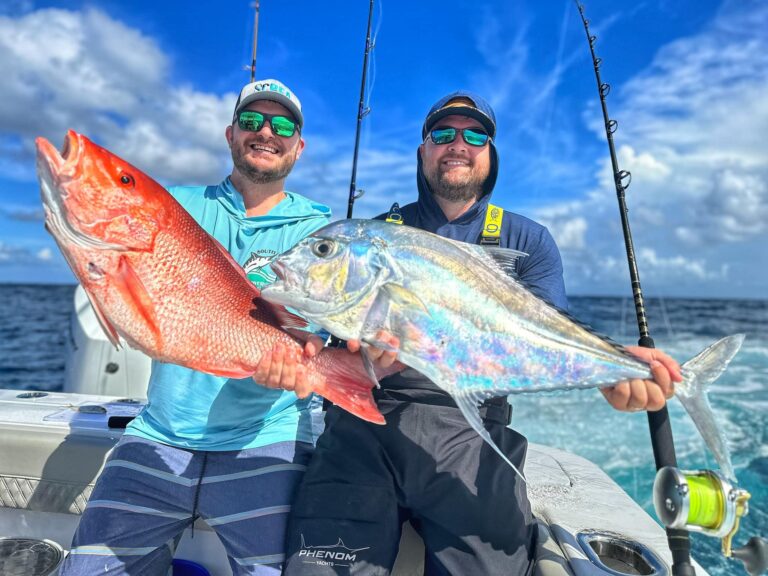New Law Gives S.C. Control Over Snapper Grouper Fisheries
South Carolina Boating & Fishing Alliance and Coastal Conservation Association South Carolina Celebrate Passage of S. 219, Paving the Way for State Control of Fisheries
May 14, 2025

COLUMBIA, SC — Governor Henry McMaster last week signed into law Senate Bill 219, marking a significant victory in the movement toward state management of the snapper-grouper fishery.
Championed by State Senator Stephen Goldfinch (R-Georgetown), the new law sets up a state-specific fishing season for all 55 species in the snapper-grouper species complex.
“This new law reflects South Carolina’s commitment to common sense, homegrown solutions,” said Governor Henry McMaster. “Our anglers deserve a system that’s fair, science-driven, and tailored to our state’s unique waters, not a one size fits all approach. With S. 219, we begin putting our state in the driver’s seat to manage our resources responsibly and protect access for current and future generations.”
The law’s signing comes at a crucial time, just weeks after Florida Governor Ron DeSantis announced a record-breaking 126-day red snapper season for anglers on the Gulf of America in 2025.
In contrast, anglers in the South Atlantic (South Carolina, North Carolina, Georgia, and Florida) may only have one day of snapper fishing and could potentially lose all access to bottom fishing for 55 stocks of fish in parts of the region due to Amendment 59, proposed by the Biden Administration seven days before he left office.
S.C. new state law establishes fishing seasons, catch limits, and minimum size requirements for 55 species of fish under the Snapper-Grouper Fishery Management Plan out to three nautical miles, which were previously governed solely by federal restrictions.
“This law affirms South Carolina’s capacity to manage our state waters with precision and purpose and will assist the agency in expanding data collection efforts” said Dr. Tom Mullikin, Director of the South Carolina Department of Natural Resources. “We are committed to developing and using locally informed science to create more fishing access while preserving marine ecosystems. This law is proof that conservation and access can go hand in hand.”
The law builds upon Senator Goldfinch’s previous efforts to exclude red snapper and black sea bass from federal regulations in state waters. The new law expands this framework to include all 55 species under the snapper-grouper complex, giving South Carolina greater control over its fisheries.
This represents a critical step toward securing local control over South Carolina’s fisheries, addressing the overregulation that has historically limited opportunities for the state’s anglers and boaters.
“For too long, we’ve been bound by federal regulations that don’t make sense for South Carolina,” said Senator Goldfinch. “While Gulf states are expanding their fishing seasons, we’ve continuously faced more restrictive measures based off flawed science and data practices from NOAA (National Oceanic and Atmospheric Administration), leading to just a single day of snapper fishing and threatened closures. This bill gives us the starting point we need to protect our fisheries to maximize fishing opportunities for South Carolina’s anglers. This law is not just a win for anglers; it’s a win for everyone who values our state’s natural resources.”
NOAA has admitted multiple times over the past 13 years that its Marine Recreational Information Program (MRIP) data, used to inform fishing regulations, is flawed, most recently confessing to overestimating catch by up to 40%. These repeated errors in data management underscore the need for a more reliable, locally informed approach to fisheries management.
“Senator Goldfinch has been a tireless advocate for our state’s fishing communities,” said Gettys Brannon, President and CEO of the South Carolina Boating & Fishing Alliance. “This law empowers South Carolina to begin taking control of its fisheries, ensuring that our anglers and boaters are on a path where they no longer face the restrictive and often misinformed regulations imposed by NOAA. This is a win for the recreational fishing community and the state’s economy.”
Scott Whitaker, Executive Director CCA South Carolina, echoed these sentiments: “This law marks a significant shift in how we manage our marine resources, moving away from overbearing federal oversight and towards local, science-based decision-making. We are grateful for the leadership of Senator Goldfinch, Governor McMaster, Director Mullikin and all those who have supported this legislation to protect both our environment and our fishing heritage.”
S. 219’s passage is also praised by national conservation leaders, including Jeff Angers, President of the Center for Sportfishing Policy, who said: “South Carolina is at the front of the pack with its can-do attitude; its stand-out director and its newly enacted snapper grouper seasons in state waters.”
South Carolina’s boating and fishing industry contributes $6.5 billion annually to the state’s economy and supports more than 27,100 jobs. The passage of S.219 marks a major step toward long-sought state control over the snapper-grouper fishery in the South Atlantic — an approach that has served as both an economic boon and a blueprint for sustainable fisheries management in the Gulf of America since its implementation in 2017. This state-led model has not only expanded access for anglers but also strengthened conservation outcomes through more accurate, locally driven data collection.
South Carolina’s congressional delegation has consistently advocated for state management measures, recognizing the need for local control over the state’s valuable fisheries resources.
The law received broad national support from the Center for Sportfishing Policy, Congressional Sportsmen’s Foundation, American Sportfishing Association, and Coastal Conservation Association.
Protecting and Expanding Boating and Fishing in South Carolina
©2021 South Carolina Boating and Fishing Alliance. All Rights Reserved.

